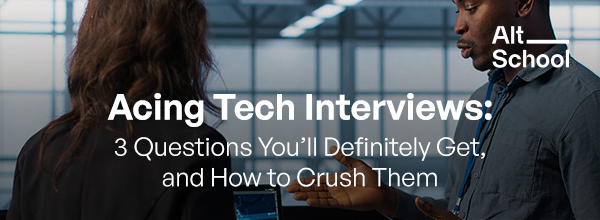
11 Jun 2025 Acing Tech Interviews: 3 Questions You’ll Definitely Get, and How to Crush Them
Good morning, future superstars! It’s probably Monday or any other day where you are and if a tech interview is looming on your calendar, first of all, breathe. You’ve got this.
Whether you’re chasing a product management gig, a sales role, or just breaking into Africa’s booming digital space, interviews can feel like a boss level you’re not quite ready for. But here’s the thing: with the right prep, you’ll walk in cool, calm, and ready to own it.
Today, we’ll break down three common questions you’re likely to face (both technical and behavioral), share sample answers, and give you practical strategies to walk into that interview with confidence. I’ll break them down with examples, tips, and the kind of practical advice that actually works.
Let’s get you interview-ready!
Question 1: “Tell Me About Yourself” (Behavioral)
Ah yes, the interview classic. Sounds simple, right? But this question isn’t just small talk, it’s your elevator pitch. The recruiter wants to know who you are, what you’ve done, and why you’re sitting in front of them today.
Here’s a great approach:
“I’m a recent AltSchool Africa grad who jumped into product management, where I helped design a campaign that boosted user sign-ups by 20% in a group project. Before that, I worked in retail, so I’ve got solid people skills that help me understand user needs. I’m passionate about tech’s impact in Africa and can’t wait to be part of a team that’s building big things.”
Quick tips:
- Keep it under 2 minutes.
- Use the STAR method (Situation, Task, Action, Result) to shape your story.
- Research the company (check their website or X posts) and weave in how your goals align. For example, if they prioritize AI, mention your interest in it.
- Practice aloud! Record yourself or run through it with a friend.
Question 2: “How would you handle a tight deadline with limited resources?” (Technical)
For tech roles like software engineering,this tests your problem-solving and resourcefulness, common in tech roles beyond coding. It’s a staple in coding interviews, especially for entry-level positions.
This one’s about showing how you handle pressure, and no, you don’t need to be a genius coder for that.
Try something like this:
“During a school project, we had just two days and zero budget to prepare a pitch. I pulled the team together, split tasks based on strengths, and we used free tools like Canva and Google Slides. We nailed it on time, and our lecturer highlighted our creativity. That taught me to stay calm, plan fast, and trust my team.”
What works here?
- You’re showing initiative, creativity, and teamwork.
- You’re staying solution-focused, not whining about the problem.
- Tools like Canva, Trello, or Notion are great to name-drop if you’ve used them, adding credibility.
And hey, if you get stuck in the moment, it’s 100% okay to say:
“That’s a great question, can I take a moment to think?” It shows maturity, not weakness.
Question 3: “How do you handle conflict in a team?” (Behavioral)
Teams thrive on collaboration, and this question assesses your soft skills, crucial for roles like product management. It’s common in both tech and non-tech interviews.
You will get a question about soft skills. Especially in tech, where collaboration is everything, even if you’re not writing code.
Here’s a smart way to tackle it:
“In my last group project at AltSchool Africa, a teammate and I disagreed on a feature’s priority. I suggested we step back, define our goals, and review the project timeline. We used a quick vote and agreed to prioritize based on user needs, which we validated with a small survey. This resolved the conflict, and we delivered the project on time, boosting our team’s morale. I learned that open communication and data-driven decisions are key to teamwork.”
Prep Strategy
- Reflect on Experiences: Think of past team scenarios, school, work, or personal projects, and pick one with a positive outcome.
- Use STAR: Describe the Situation, Task, Action you took, and Result achieved.
- Highlight Skills: Emphasize communication, empathy, and problem-solving. For example, mention tools like Slack or Trello if you used them.
- Practice Delivery: Keep it concise (2-3 minutes) and positive, avoiding blame.
Bonus Round: Prep Like a Pro
Some final gems to help you go from “I hope I survive this” to “I crushed it”:
Research the Role: Study the job description and company mission. If it’s a tech firm in Nigeria, check X for recent updates—@TechCabal often posts about local tech trends.
Mock Interviews: Use platforms like Interviewing.io or ask a mentor to simulate the experience. Record yourself to spot areas for improvement.
Build a Toolkit: Have a notepad with key points (e.g., projects, skills) and a stable internet connection if it’s virtual. A 2024 Forbes article recommends a quiet space and a backup device.
Mindset Matters: Treat mistakes as learning opportunities. If you don’t know the answer, say, “I’m not sure, but I’d approach it by…” showing willingness to learn is a plus.
Follow Up: Send a thank-you email post-interview, referencing something specific from the chat.
Tech in Africa is exploding. From Lagos to Nairobi, there are millions of roles emerging, product, sales, digital marketing, you name it. The skills matter, yes, but your fit, energy, and approach are what seal the deal.
So don’t just prep—own your prep. Rehearse. Research. Record. Reflect


Sorry, the comment form is closed at this time.